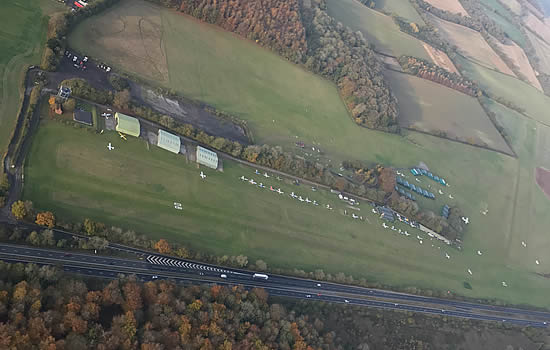 |
United Kingdom: UK General Aviation responds to radical planning reform proposalsBy Ian Sheppard |
A high-level letter from Lord Davies of Gower, chair of the All-Party Parliamentary Group for General Aviation (APPG-GA), to UK Housing Minister Robert Jenrick MP has sought to clarify the planning reform outlined by Jenrick’s Department recently, in particular its proposals on new Planning Zones.
The letter is signed from Lord Davies and copied to the Secretary of State for Transport (and former APPG-GA chairman) Grant Shapps, and Kelly Tolhurst, Minister for Aviation, The Ministry of Housing, Communities and Local Government (MHCLG).
In the letter, titled ‘Planning for the Future: Airfields’, Lord Gower states: “The intention to streamline the planning process, speed up decision making and increase certainty is welcomed. However, the way in which policies will be framed for General Aviation (GA) airfields is currently unclear.”
He undelines the contribution of GA to the UK economy, centred on airfields that could come under increased threat if planning laws are eased further to help the economic recovery.
Major economic contribution
“The UK’s prosperous General Aviation Sector contributed £3.3 billion to the UK economy in 2015… more recently this has been estimated at over twice that level by industry experts. It is a vital element of the UK’s transport infrastructure, helping to support our world class commercial aviation and aerospace industry, providing as it does a crucial entry point for the pilots and engineers of tomorrow.
“Accordingly, General Aviation airfields are therefore critical sites available for the accommodation of the transport and logistics infrastructure of the future - including the new generation of electric aircraft, UAVs (drones) and air taxis now emerging.”
The APPG-GA under the chairmanship of Grant Shapps enjoyed some early success in gaining real recognition for airfields, cemented in “soft law” planning guidance, if not yet hard law.
“The 2018 NPPF [National Planning Policy Framework] introduced new provisions for General Aviation obligating local planning authorities to shape their policies to recognise the importance of maintaining a national network of general aviation airfields and the need for them to adapt and change over time – taking into account their economic value in serving business, leisure, training and emergency service needs and the Government’s General Aviation Strategy,” states Lord Davies’ letter.
“Some planning authorities have already adopted local plan policies which specifically identify GA airfields, encourage aviation related development on such sites and protect the sites from the threat of inappropriate development which would inhibit GA’s utilisation of the site. In other cases, where Local Plans are still emerging, local planning authorities are being encouraged to include similarly positive policies.”
World class GA
The Department for Transport in its Aviation Strategy has underlined the importance of General Aviation and the government has stated its ambition to make the UK’s GA industry ‘the envy of the world'.
‘Lord Davies points out, however, that “the current Consultation Document [in planning reform] is unclear as to how GA airfields would be protected under the new proposals.
“It is therefore essential,” he continues, “that further guidance on the status of GA airfields is set out by MHCLG to avoid local authorities, particularly where Local Plan policies are not compliant with the NPPF, inappropriately placing them in the wrong zone.”
The APPG-GA considers the proposed ‘Renewal’ Zone to be most appropriate for established GA airfields as it would “give certainty” to airfield owners and operators that their own development plans would be acceptable. The Group, however, believes that the definition of ‘Renewal’ should extend beyond the current assumption that the Zone would generally relate to urban or brownfield locations. It suggests a fourth Zone, for ‘Infrastructure’.
“We believe that there are other types of land use comparable to GA Airfields that may not easily fit into the current three categories - for example - hospital grounds and cargo ports.” the APPG Chair states.

Popham Airfield, Hampshire, UK.
GA airfields under pressure
The APPG for GA points to some examples of the challenges airfields have been grappling with, where Zoning for ‘Infrastructure’ or ‘Renewal’ would help, such as:
-
Resistance from local residents to airfield development, which “can deter valuable and necessary investment and significantly add to the cost of the planning process.” Often this resistance comes from residents who have moved into an area “but failed to check on the proximity and activities of an existing airfield.”
-
In some cases entire airfields have been regarded as ‘Brownfield’ and therefore ‘available’ for wholesale redevelopment (despite planning guidance caveats), creating uncertainty, deterred investment and leading, in some cases, to long planning battles.
-
Some GA airfields are located in the Green Belt – it is essential to ensure that they are zoned as Infrastructure and/or Growth and not in the ‘Protected’ category to recognise their infrastructure / aviation value.
-
GA airfields (both licensed and unlicensed) need ‘Safeguarding’, ensuring that local development initiatives separate from the airfield always has to take its existence into account, whether for safety, economic or other reasons.
Unlike [mainland] Europe, very few new airfields have been built since 1945. The reality is that once they disappear, they are invariably gone forever. If any further airfields are lost from the remaining Network, it will seriously undermine the ability of the General Aviation industry to continue in the UK.”
Electric flight pioneers
Lord Davies concludes with a reference to the promising, environmentally sustainable future of the GA sector: “The age of electric flight is dawning… this sea change in operability and pricing is likely to have a major impact on demand while putting General Aviation at the forefront of applying green transport technology.
The APPG-GA is hoping for a considered response to Lord Davies’ letter so GA representatives can be fully in the picture as to the measures being considered by the MHCLG, and how they can serve “to protect the country’s vital network of GA airfields.”
 |
Ian Sheppard is based at Redhill Aerodrome, near London's Gatwick Airport, where he runs his own company, First Aerospace Media, Ian is a part-time flying instructor for Harvard Aviation, flying Piper PA-28s. He has worked for numerous aviation publications and edited Aerospace International, African Aerospace, Regional International and Aircraft Owner & Pilot (AOPA UK). For many years he was also international shows editor for Aviation International News. Currently, he has various projects (such as an Apollo Space Watch and a new airfield!) while also writing for GA Buyer Europe, sub-editing AvBuyer magazine, and acting as |
| communications adviser for the General Aviation Awareness Council (GAAC.) Recently, Ian has also started working with Hong-Kong based White Orchid Insights as their head of aviation. Ian has three (almost grown up) sons. | |
BlueSky Business Aviation News | 3rd September 2020 | Issue #571
Share this article


